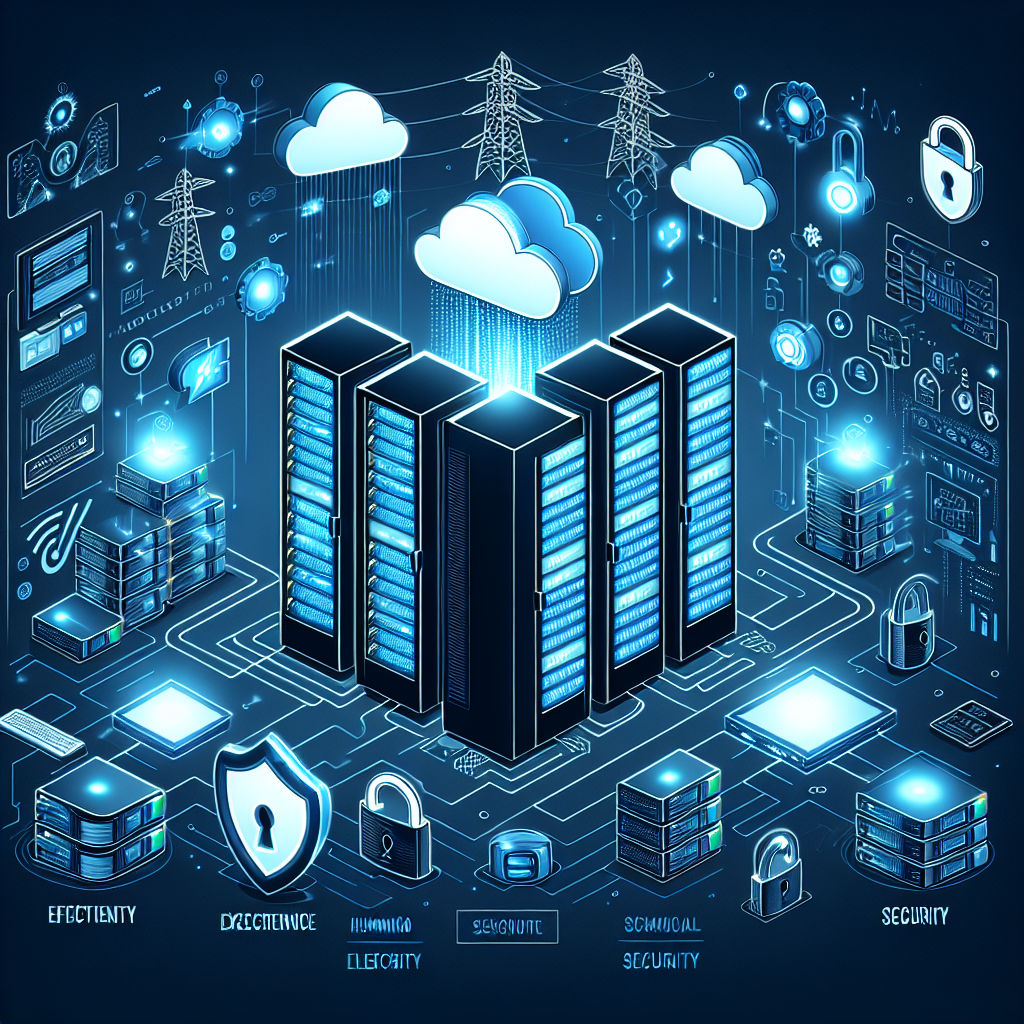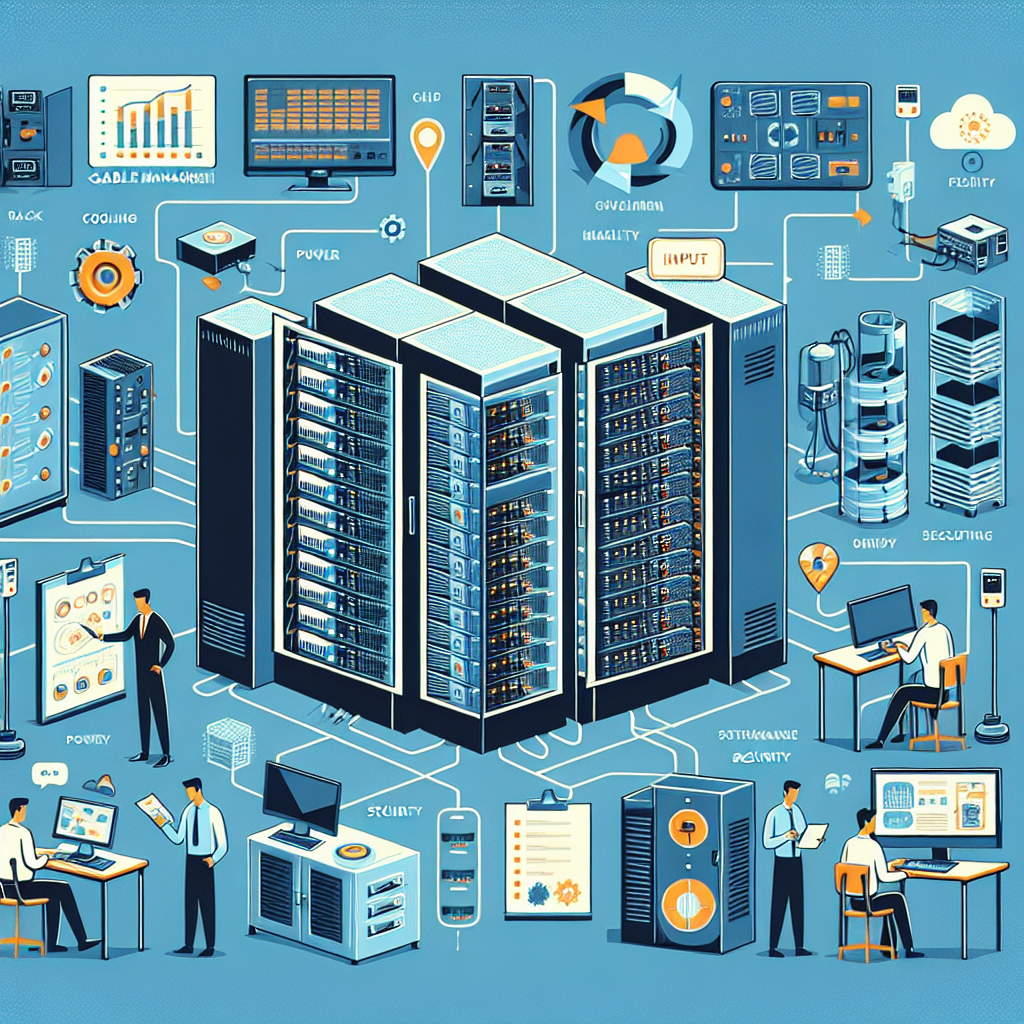Your cart is currently empty!
Tag: Data Center Facilities Management

The Importance of Data Center Facilities Management: Ensuring Efficiency and Security
Data centers play a crucial role in today’s digital world, serving as the backbone of businesses and organizations by storing, processing, and managing vast amounts of data. With the increasing reliance on technology and the growing volume of data being generated, it has become more important than ever to ensure that data center facilities are efficiently managed and secure.Facilities management in data centers involves overseeing the physical infrastructure, equipment, and systems that support the operation of the facility. This includes everything from cooling systems and power distribution to security measures and disaster recovery plans. By properly managing these aspects of a data center, businesses can ensure that their operations run smoothly, efficiently, and securely.
Efficiency is a key factor in data center facilities management. Inefficient operations can lead to increased energy consumption, higher costs, and reduced performance. By implementing best practices in data center design and management, businesses can optimize their operations, reduce energy consumption, and improve overall performance.
One important aspect of data center efficiency is cooling. Data centers generate a significant amount of heat due to the high-powered equipment and servers housed within them. Proper cooling systems are essential to maintain optimal operating temperatures and prevent equipment from overheating. By implementing efficient cooling solutions, businesses can reduce energy consumption and prolong the life of their equipment.
Security is another critical aspect of data center facilities management. Data centers house sensitive and valuable information, making them a prime target for cyber attacks and physical security breaches. By implementing robust security measures, such as access controls, surveillance systems, and encryption protocols, businesses can protect their data and ensure the integrity of their operations.
Disaster recovery planning is also an important component of data center facilities management. Natural disasters, power outages, and other unforeseen events can disrupt data center operations and potentially lead to data loss. By developing and implementing a comprehensive disaster recovery plan, businesses can minimize downtime, protect their data, and ensure business continuity in the event of a crisis.
In conclusion, data center facilities management is essential for ensuring the efficiency and security of data center operations. By implementing best practices in cooling, security, and disaster recovery planning, businesses can optimize their operations, protect their data, and ensure the reliability of their data center facilities. Investing in proper facilities management is crucial for businesses looking to stay competitive in today’s digital landscape.

Best Practices for Effective Data Center Facilities Management
In today’s digital age, data centers play a crucial role in storing, processing, and managing large amounts of data for organizations of all sizes. As data center facilities continue to grow in complexity and scale, effective data center facilities management has become more important than ever. To ensure optimal performance and efficiency, data center managers must follow best practices in managing and maintaining these facilities.Here are some best practices for effective data center facilities management:
1. Regular maintenance and monitoring: Regular maintenance and monitoring of data center facilities are essential to identify and address potential issues before they escalate into major problems. This includes routine inspections of power distribution systems, cooling systems, and other critical infrastructure components. Monitoring tools can also be used to track performance metrics and alert managers to any abnormalities.
2. Efficient cooling systems: Cooling systems are critical for maintaining the optimal operating temperature in data centers. To prevent overheating and ensure the reliability of IT equipment, data center managers must implement efficient cooling solutions, such as hot aisle/cold aisle containment, raised floor cooling, and in-row cooling units. Regular maintenance of cooling systems is also necessary to ensure they are operating at peak efficiency.
3. Energy efficiency: Data centers are significant consumers of energy, so it is essential to implement energy-efficient practices to reduce operating costs and minimize environmental impact. This includes using energy-efficient equipment, implementing virtualization technologies, and optimizing airflow management. Data center managers should also consider renewable energy sources, such as solar or wind power, to further reduce their carbon footprint.
4. Disaster recovery and business continuity planning: Data center facilities are vulnerable to various risks, including natural disasters, power outages, and cyber-attacks. To mitigate these risks, data center managers must develop and implement comprehensive disaster recovery and business continuity plans. This includes regular backups of critical data, redundant power and cooling systems, and off-site data storage facilities.
5. Security measures: Data centers house sensitive and valuable information, so it is crucial to implement robust security measures to protect against unauthorized access and cyber threats. This includes physical security measures, such as biometric access controls and surveillance cameras, as well as cybersecurity measures, such as firewalls, intrusion detection systems, and encryption protocols.
6. Documentation and asset management: Effective data center facilities management requires careful documentation and asset management to track and maintain all equipment, systems, and configurations. This includes creating detailed inventory lists, labeling equipment, and documenting maintenance schedules and procedures. Asset management tools can also help track equipment lifecycles, warranties, and service contracts.
By following these best practices for effective data center facilities management, organizations can ensure the reliability, performance, and security of their data center facilities. With the increasing importance of data in today’s digital economy, proper management of data center facilities is crucial for the success of any organization.

The Importance of Data Center Facilities Management
Data centers are the backbone of modern businesses, serving as the centralized hub for storing, processing, and managing data. With the exponential growth of data in today’s digital age, the importance of data center facilities management cannot be overstated.Data center facilities management involves the supervision and maintenance of the physical infrastructure of the data center, including power and cooling systems, security measures, and equipment upkeep. This critical function ensures that data centers operate efficiently, securely, and reliably to support the organization’s IT operations.
One of the key reasons why data center facilities management is essential is to guarantee the continuous operation of business-critical applications and services. Downtime in a data center can result in significant financial losses, as businesses rely on their IT infrastructure to serve customers, process transactions, and run operations. Proper facilities management helps prevent unexpected downtime by proactively monitoring and maintaining the data center environment.
Another important aspect of data center facilities management is ensuring data security and compliance with regulatory requirements. Data centers store sensitive information, such as customer data, intellectual property, and financial records, making them a prime target for cyberattacks. By implementing robust security measures, such as access controls, surveillance systems, and fire suppression systems, facilities managers can safeguard data center assets and protect valuable data from unauthorized access or theft.
Furthermore, efficient power and cooling management are critical to optimizing data center performance and reducing operational costs. Data centers consume a significant amount of energy to power servers, storage systems, and networking equipment, as well as to regulate temperature and humidity levels. By implementing energy-efficient technologies and practices, such as virtualization, server consolidation, and airflow management, facilities managers can reduce power consumption, lower utility bills, and minimize the environmental impact of data center operations.
In conclusion, data center facilities management plays a crucial role in ensuring the reliability, security, and efficiency of data center operations. By investing in proper facilities management practices, businesses can mitigate risks, enhance productivity, and achieve their IT objectives. As data continues to grow in volume and importance, the need for effective data center facilities management will only continue to increase in significance.

Case Studies in Successful Data Center Facilities Management Implementation.
Data centers are the backbone of modern businesses, housing and managing critical IT infrastructure such as servers, storage, and networking equipment. With the increasing reliance on technology for day-to-day operations, the importance of effective data center facilities management cannot be overstated. In recent years, many organizations have turned to data center facilities management solutions to optimize their operations and ensure maximum uptime and efficiency.One of the key aspects of successful data center facilities management is the implementation of best practices and innovative technologies. Case studies of organizations that have successfully implemented data center facilities management solutions can provide valuable insights for businesses looking to improve their own operations.
One such case study is that of a global financial services company that was facing challenges with managing multiple data centers across different regions. The company implemented a comprehensive data center facilities management solution that included real-time monitoring, predictive maintenance, and energy optimization. By leveraging advanced analytics and automation tools, the company was able to improve efficiency, reduce downtime, and lower operating costs.
Another successful case study is that of a healthcare organization that was struggling with aging infrastructure and increasing demand for IT services. The organization implemented a data center facilities management solution that included virtualization, cloud migration, and disaster recovery planning. By consolidating its data centers and adopting a more agile and scalable infrastructure, the organization was able to improve service delivery, streamline operations, and enhance security.
In both of these case studies, the key to success was the strategic alignment of business goals with data center facilities management initiatives. By investing in the right technologies and processes, organizations were able to achieve significant improvements in performance, reliability, and cost savings.
As businesses continue to rely on data centers to support their operations, the importance of effective facilities management will only continue to grow. By learning from successful case studies and implementing best practices, organizations can optimize their data center operations and stay ahead of the competition.

Key Considerations for Outsourcing Data Center Facilities Management
Data centers are the backbone of modern businesses, housing critical IT infrastructure and data that are vital for daily operations. Managing these facilities can be a complex and resource-intensive task, requiring specialized skills and expertise. As such, many companies are turning to outsourcing data center facilities management to third-party providers to ensure optimal performance and efficiency.When considering outsourcing data center facilities management, there are several key factors that organizations should take into account to make an informed decision:
1. Expertise and Experience: It is crucial to partner with a provider that has a proven track record in managing data center facilities. Look for a company with extensive experience in the industry and a team of skilled professionals who are knowledgeable about best practices and industry standards.
2. Service Level Agreements (SLAs): Before signing any contract, make sure to clearly define the services that will be provided and establish SLAs that outline the responsibilities of both parties. SLAs should include key performance indicators (KPIs) that measure the effectiveness of the services being delivered.
3. Scalability: As your business grows, your data center needs may also evolve. Ensure that the provider you choose can scale their services to accommodate your changing requirements. Look for a flexible and adaptable partner who can support your growth and expansion.
4. Compliance and Security: Data centers house sensitive and confidential information, making security and compliance a top priority. Make sure that the provider you select adheres to industry regulations and standards, such as ISO 27001 and SOC 2, and has robust security measures in place to protect your data.
5. Disaster Recovery and Business Continuity: Unexpected events such as natural disasters or cyberattacks can disrupt your operations and cause downtime. Ensure that your provider has a comprehensive disaster recovery plan in place to minimize the impact of any disruptions and ensure business continuity.
6. Cost: Outsourcing data center facilities management can be a cost-effective solution for many organizations, as it eliminates the need for investing in expensive infrastructure and hiring dedicated staff. However, it is important to carefully evaluate the costs involved and ensure that the services provided align with your budget and business objectives.
In conclusion, outsourcing data center facilities management can offer numerous benefits for organizations, including improved performance, efficiency, and scalability. By considering these key factors when selecting a provider, businesses can ensure a successful partnership that meets their needs and supports their long-term growth and success.

Strategies for Energy-Efficient Data Center Facilities Management
In today’s digital age, data centers play a crucial role in storing, processing, and managing vast amounts of data for businesses and organizations. However, data centers are also known for their energy-intensive operations, consuming a significant amount of electricity to power servers, cooling systems, and other equipment. With the rising costs of electricity and growing concerns about environmental impact, it has become increasingly important for data center managers to implement strategies for energy-efficient facilities management.There are several key strategies that can help data center facilities reduce their energy consumption and improve overall efficiency. One of the most effective ways to achieve this is by investing in energy-efficient equipment. This includes servers, cooling systems, and other hardware that are designed to consume less power while still delivering high performance. By upgrading to more energy-efficient equipment, data centers can significantly reduce their energy consumption and lower their operating costs.
Another important strategy for energy-efficient data center facilities management is optimizing airflow and cooling systems. Proper airflow management can help reduce the need for excessive cooling, which can account for a significant portion of a data center’s energy consumption. By implementing hot and cold aisle containment systems, using blanking panels to prevent air leakage, and optimizing the placement of cooling units, data center managers can improve the efficiency of their cooling systems and reduce energy waste.
In addition to equipment and cooling system upgrades, data center managers can also implement software-based energy management solutions to monitor and control energy usage. By utilizing energy management software, data center facilities can track their energy consumption in real-time, identify areas of inefficiency, and implement strategies to reduce energy waste. This can include scheduling equipment to run during off-peak hours, implementing power-saving modes on servers and other hardware, and adjusting cooling settings based on temperature and workload requirements.
Furthermore, data center managers can also explore renewable energy options to power their facilities. This can include installing solar panels, wind turbines, or other renewable energy sources to supplement or replace traditional grid electricity. By generating their own renewable energy, data centers can reduce their reliance on fossil fuels, lower their carbon footprint, and potentially save money on electricity costs in the long run.
Overall, implementing energy-efficient strategies for data center facilities management is essential for reducing energy consumption, lowering operating costs, and minimizing environmental impact. By investing in energy-efficient equipment, optimizing airflow and cooling systems, utilizing energy management software, and exploring renewable energy options, data center managers can create a more sustainable and efficient operation that benefits both their bottom line and the planet.

How Data Center Facilities Management Can Impact Business Continuity
Data centers are the backbone of the modern digital economy, serving as the nerve center for businesses to store, process, and transmit data. In today’s digital age, the importance of data center facilities management cannot be overstated, as any disruptions in these facilities can have a significant impact on business continuity.Data center facilities management refers to the practices and processes involved in maintaining and operating data center facilities to ensure their optimal performance and reliability. This includes monitoring and controlling the physical environment of the data center, such as temperature, humidity, and power supply, as well as managing security, maintenance, and disaster recovery plans.
The impact of effective data center facilities management on business continuity is profound. Here are some key ways in which it can influence the overall resilience of a business:
1. Minimizing Downtime: Downtime in a data center can have catastrophic consequences for a business, leading to financial losses, damaged reputation, and even legal implications. Effective facilities management can help prevent downtime by ensuring that all systems are operating efficiently, monitoring for potential issues, and implementing proactive maintenance procedures.
2. Ensuring Data Security: Data security is a top priority for businesses in the digital age, and data center facilities management plays a crucial role in safeguarding sensitive information. By implementing robust security measures, monitoring access controls, and regularly testing security systems, facilities managers can help protect data from breaches and cyber-attacks.
3. Disaster Recovery Planning: In the event of a natural disaster, power outage, or other unforeseen event, having a solid disaster recovery plan in place is essential for business continuity. Data center facilities management involves developing and testing disaster recovery plans, ensuring that data can be quickly and securely restored in the event of a disruption.
4. Energy Efficiency: Data centers are notorious for their high energy consumption, which can have a significant impact on operational costs and environmental sustainability. Facilities managers can implement energy-efficient practices, such as virtualization, cooling optimization, and equipment upgrades, to reduce energy consumption and lower operating costs.
In conclusion, data center facilities management is a critical component of ensuring business continuity in today’s digital economy. By implementing best practices in monitoring, maintenance, security, and disaster recovery planning, facilities managers can help businesses mitigate risks, minimize downtime, and ensure the uninterrupted operation of their data center facilities. Investing in effective facilities management is not only a sound business decision but also a strategic imperative for long-term success in the digital age.

How Data Center Facilities Management Impacts Business Operations
In today’s digital age, data centers play a crucial role in the smooth functioning of businesses. These facilities house the critical IT infrastructure that enables organizations to store, process, and manage their data effectively. However, the success of a data center largely depends on efficient facilities management.Data center facilities management encompasses a wide range of tasks, including monitoring and maintaining the physical environment of the facility, managing power and cooling systems, and ensuring the security and safety of the equipment. The goal of facilities management is to optimize the performance and reliability of the data center while minimizing downtime and costs.
The impact of effective data center facilities management on business operations cannot be overstated. Here are some key ways in which it influences the overall success of an organization:
1. Improved reliability and uptime: A well-managed data center is able to provide a high level of reliability and uptime, ensuring that critical business operations can continue without interruption. This is essential for businesses that rely on their IT infrastructure to deliver products and services to customers.
2. Cost savings: Efficient facilities management can help businesses save money by optimizing energy usage, reducing maintenance costs, and extending the lifespan of equipment. By implementing best practices in data center management, organizations can lower their operating expenses and improve their bottom line.
3. Enhanced security: Data centers store sensitive and valuable information, making security a top priority. Facilities management plays a crucial role in ensuring that the data center is secure from physical threats, such as unauthorized access, theft, and natural disasters. By implementing robust security measures, businesses can protect their data and maintain the trust of their customers.
4. Scalability and flexibility: As businesses grow and evolve, their data center needs may change. Effective facilities management allows organizations to scale their infrastructure up or down quickly and efficiently to meet changing demands. This flexibility enables businesses to adapt to new technologies and market conditions without disrupting their operations.
5. Compliance and regulatory requirements: Many industries have strict regulations governing the storage and handling of data. Data center facilities management helps businesses comply with these requirements by implementing measures to protect data privacy and security. By following industry best practices, organizations can avoid costly fines and reputational damage.
In conclusion, data center facilities management plays a critical role in the success of modern businesses. By ensuring the reliability, security, and efficiency of the data center, organizations can optimize their operations, reduce costs, and stay competitive in today’s digital landscape. Investing in effective facilities management is essential for businesses looking to maximize the value of their IT infrastructure and drive growth in the digital age.

Trends in Data Center Facilities Management
Data centers are the backbone of modern technology, housing the servers and equipment that power our digital world. With the ever-increasing demand for data storage and processing capabilities, data center facilities management is becoming more important than ever. As technology continues to evolve, so too do the trends in data center facilities management.One of the biggest trends in data center facilities management is the move towards more sustainable and energy-efficient practices. With the growing awareness of climate change and the need to reduce carbon emissions, data centers are under pressure to minimize their environmental impact. This includes implementing energy-efficient cooling systems, utilizing renewable energy sources, and optimizing server utilization to reduce energy consumption.
Another trend in data center facilities management is the increasing focus on security and compliance. With the rise of cyber threats and data breaches, data center operators are investing in robust security measures to protect their infrastructure and the sensitive data stored within. This includes implementing multi-factor authentication, encryption, and intrusion detection systems to safeguard against unauthorized access.
Automation and AI are also playing a significant role in data center facilities management. Automated monitoring and management tools can help data center operators optimize performance, identify potential issues before they escalate, and streamline maintenance tasks. Artificial intelligence can also be used to predict equipment failures and optimize energy usage, leading to improved efficiency and reduced downtime.
The rise of edge computing is another trend shaping data center facilities management. Edge computing involves processing data closer to where it is generated, reducing latency and improving performance for applications that require real-time processing. This trend is driving the need for smaller, distributed data centers that can support edge computing workloads, requiring data center operators to rethink their facility design and management strategies.
Overall, data center facilities management is evolving to meet the demands of a rapidly changing technological landscape. From sustainability and security to automation and edge computing, data center operators are adapting to new trends and technologies to ensure their facilities remain efficient, secure, and reliable in the face of growing data demands. By staying ahead of these trends, data center operators can future-proof their facilities and continue to meet the needs of their customers in an increasingly digital world.

Strategies for Optimizing Data Center Facilities Performance
Data centers are the backbone of modern businesses, serving as the hub for storing, processing, and distributing vast amounts of data. As the demand for data storage and processing continues to grow exponentially, it is essential for data center facilities to operate at peak performance to ensure efficiency, reliability, and cost-effectiveness.Optimizing data center facilities performance requires a combination of strategic planning, effective management, and the implementation of advanced technologies. Here are some key strategies that can help improve the performance of data center facilities:
1. Efficient cooling systems: Data centers generate a significant amount of heat due to the continuous operation of servers and other IT equipment. Implementing efficient cooling systems, such as hot and cold aisle containment, can help regulate temperatures and prevent overheating, which can lead to equipment failure and downtime.
2. Energy-efficient equipment: Upgrading to energy-efficient servers, storage devices, and networking equipment can help reduce energy consumption and lower operating costs. Investing in energy-efficient equipment can also help improve overall performance and reliability of data center facilities.
3. Regular maintenance and monitoring: Regular maintenance and monitoring of data center facilities are essential to identify and address potential issues before they escalate into major problems. Implementing a proactive maintenance schedule and monitoring system can help prevent downtime and ensure optimal performance of data center facilities.
4. Virtualization and consolidation: Virtualization technology allows businesses to consolidate multiple servers onto a single physical server, reducing the need for physical space and lowering energy consumption. By virtualizing servers and storage devices, data center facilities can optimize performance, improve scalability, and reduce costs.
5. Implementing automation: Automation tools and software can help streamline data center operations, improve efficiency, and reduce human error. Implementing automation in tasks such as provisioning, monitoring, and troubleshooting can help optimize data center performance and enhance overall productivity.
6. Scalability and flexibility: Data center facilities should be designed with scalability and flexibility in mind to accommodate future growth and technological advancements. Implementing a modular design approach can help data centers easily adapt to changing business needs and technology requirements.
In conclusion, optimizing data center facilities performance requires a holistic approach that includes efficient cooling systems, energy-efficient equipment, regular maintenance and monitoring, virtualization and consolidation, automation, and scalability. By implementing these strategies, businesses can improve the efficiency, reliability, and cost-effectiveness of their data center facilities, ensuring smooth operations and meeting the growing demands of the digital economy.
